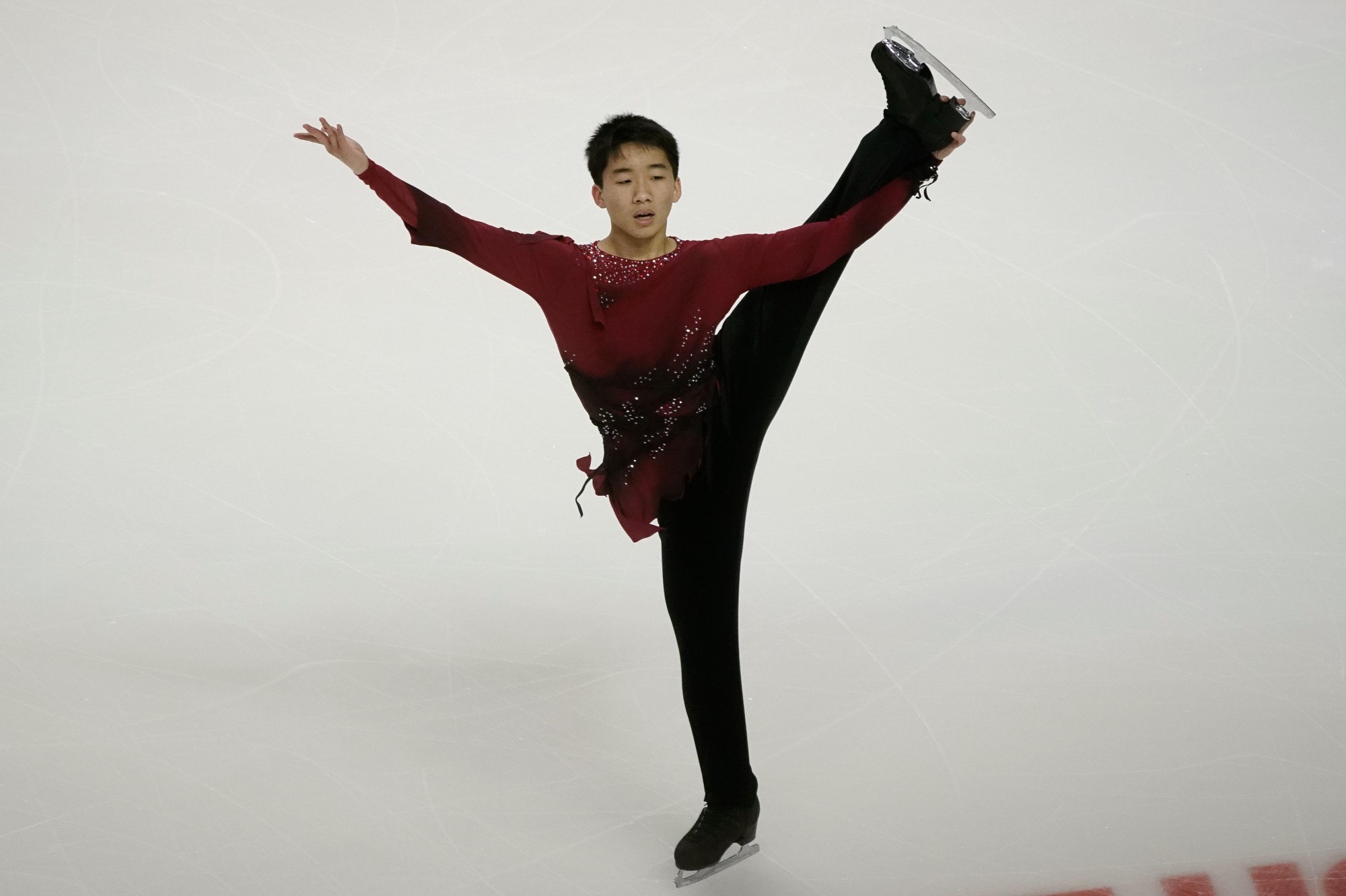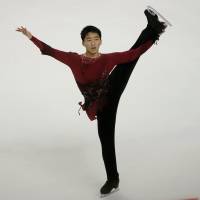At last month's Grand Prix Final in Nagoya, Ice Time sat down with ISU announcer Ted Barton, whose voice is well known to Japanese skating fans, for a discussion on a wide range of skating issues, including the International Judging System.
Barton handles the commentary on the Junior Grand Prix circuit on YouTube each campaign. The Canadian was the one who first proposed the idea of webcasting the junior events and has done an outstanding job with it over the past four seasons.
The 63-year-old Barton, who is the executive director for Skate Canada (British Columbia/Yukon), has a wealth of knowledge on the sport, having competed against the likes of John Curry and Robin Cousins in his skating days.
Ice Time asked Barton if he thought there should be a rule limiting the number of entries from one nation at the JGP Final after Russia qualified five of the six skaters entered this season. Rika Kihira was the only non-Russian in the field.
Barton said he didn't think the rules should be changed, citing the cyclical nature of the sport.
"They (Russia) have a very good management system of their kids," Barton stated. "They are young kids. They teach them beautifully. Obviously a lot of great skating skills. A lot of time on ice. Not a lot of school. They are in skating, so their life is dedicated to it.
"What I see is that they manage their young personalities very well. They keep the kids happy. I've seen the kids playing together and training together off ice."
Barton believes that camaraderie is important for young skaters.
"Although they are highly competitive, they also understand they need to be a team. I think that is good," Barton commented. "I think they identify the strengths and personalities and match the music well. The choreography has been brilliant. The concepts of their programs have been brilliant, let alone the technical stuff.
"So it's not only jumping, which they all do very well, but it's also at a tender age an understanding of the maturity of the performance. This is quite extraordinary."
Barton highlighted Kihira's progress over the past 12 months.
"Rika Kihira made a huge improvement in her performance from last year to this year," Barton said. "She was just a jumper last year. Now she is a much more all-around skater. I saw a range of movement and this emotional commitment this season."
Russia's coaching magician
Ice Time then questioned Barton about the recent phenomenal work of Russian coach Eteri Tutberidze, who has displayed nothing short of a magic wand in her development of young skaters. The Moscow native coaches two of the medal contenders for the Pyeongchang Olympics — two-time world champion Evgenia Medvedeva and senior GP Final title winner Alina Zagitova.
"There are four skaters from that team (Tutberidze's) here (at the JGP Final) and she has more at home," Barton noted. "It's sort of like a coach of a baseball team in Japan or a hockey team in Canada. When you've got a talent pool and you are young as a coach and you have great energy and you have great desire and commit your life to it, you are going to be in a positive swing. And that's what she is.
"She has a great team of coaches. She is dedicating her life to it and she has a lot of talent. That will change in time. It does with everyone."
Barton believes one of the key's to the 43-year-old Tutberidze's success is her own personal traits.
"She is a very competitive lady," Barton stated. "I saw an interview where she was asked, 'So Russian skating has really improved in ladies. What do you think the difference is?'
"She said, 'Because I moved back home.' "
Respect for Japanese culture
Barton then spoke about coach Mie Hamada, who has quite a team of her own in four-time national champion Satoko Miyahara, Kihira, Marin Honda and Yuna Shiraiwa.
Hamada informed Barton about some of her philosophy.
"I'm quite strict. You have to be," she told Barton. "They count on you to be. You cannot turn out good skating unless there is some discipline."
Barton then cited some of what he admires about Japan.
"That's one of the great things about this culture," Barton commented. "They are very gracious. They are very kind. They are very sensitive. But they are also very determined and strict.
"I will bet that in the next number of years Japanese skating is going to take on another level. These kids are amazing skaters."
Disagrees with Button
Ice Time queried Barton about the present judging system (that was adopted in 2004) and the recent talk that too much focus is on the athletic elements (jumps) and not enough on artistry (program components).
Barton spent more than a year helping to craft the present system and is a staunch defender of it.
"I'm very pleased with the judging system, although there are things that need to be constantly worked out," Barton said. "We would not have the sport where it is today without this judging system."
When Ice Time mentioned that during an October interview two-time Olympic champion and skating legend Dick Button told me he blamed the system for athleticism superseding artistry in skating.
"I disagree with that statement. It is incorrect," Barton stated firmly. "You are not going to tell me that the performances, even of the 13- and 14-year-olds girls, the dance with the beautiful pieces of music, and even the vocals isn't emotional, isn't connected. These kids are more emotionally connected. This is not a tweak on anybody in the past, it's just the evolution of mankind."
Barton said it is a new day and the old way had to be changed.
"The kids are younger. They are learning more and there are more tools for them to see, to witness and learn from," Barton noted. "I never want to be an older person in my life criticizing the current day because it was not my day. The past was great. The past was the past."
Ice Time then told Barton that Button had said, "Brian Boitano and I couldn't do a quadruple jump if our lives depended on it."
Barton begged to differ with this statement as well, saying that Button didn't realize how great he was.
"Dick Button was an amazing athlete. I have his old footage," Barton commented. "He was a remarkable jumper for his day. He jumped so high. He was straighter and rotating faster. He doesn't know what he could have done because there were no standards at the time. He was the standard.
"If somebody else was there doing a quad, he probably would have done it easily. Because he was strong and fit and smart and had desire. Those guys were probably way more capable than they thought because human beings today are doing it. The standard is just higher.
"I think these people are hitting it. We are seeing some spectacularly beautiful and emotional performances that are athletically at the highest level."
Striving to reach the world
Ice Time touched upon the progress that the ISU's YouTube channel has made in helping to promote skating.
"One of the things that we are pleased about, aside from the skating on the ice, is the effort of the ISU, myself and our crew to invade the rest of the world with our sport," Barton said. "Get our sport in front of people who have never seen it. Get them engaged in it. Get them committed to it. Many rinks pop up, other kids want to get involved in it, because the rest of the world hasn't seen it."
Barton believes that to move skating forward on the global stage it can't rely solely on TV anymore.
"When you leave it to television only, not to be critical of television, Japanese TV does it in Japan," he said. "It's the same in America or Canada, but who looks after Kuwait, Chile, Argentina, Mexico and all those other countries?
"No one does. So we are trying to globalize the sport. To this point we have been very successful."
Barton, who first conceived the idea of web streaming of skating in his native Canada to help young skaters in rural areas learn from their peers, and then presented the idea to the ISU, still sees the concept as a teaching tool.
"I think what we do can inspire kids, can help educate kids, can help kids be patient," Barton stated. "Not critiquing them as a TV commentator would do. Giving them the type of support they require.
"We try to bring a little humanity to what we do. As much as we celebrate the sport and are engaged in it, these are kids and young adults and it is difficult what they do. It is important to be honest but fair.
"When you average it out on YouTube, we drew about a million views a week. A million views per competition."
Barton closed the chat talking about an idea he would like to pursue in the future.
"One of the things I would love to do is a documentary on some of the training centers and teams of the world," Barton commented. "Certainly come here to Japan. Go to Russia, Canada and the United States. To study how coaches bring up kids. How they bring up the person, the child person into the adult person. The child athlete into the adult athlete. Tell the stories, because they are remarkable stories."
Barton then made a statement that Ice Time is in complete agreement with — how tough skating is.
"In a lot of the world I don't think it is understood how difficult this sport is," Barton said. "I do not believe that the general public understands the physicality and psychology of this sport in comparison to other sports.
"There is no helmet. There are no other people on the ice. There's you by yourself and every mistake is seen by all people. Put anybody under pressure like that and it is huge."
Hiwatashi 12th at nationals
Tomoki Hiwatashi finished 12th at the U.S. national championships over the weekend in San Jose, California, and has been selected to the American team for the world junior championships in March in Sofia, Bulgaria.
Hiwatashi gave Ice Time his thoughts on his performance via email on Monday.
"Before the short program, I really felt ready. I went on the ice and I thought I could do everything," Hiwatashi wrote. "Unfortunately, it didn't go as planned and I messed up all my jumps and skated terrible which led me to getting 15th. I was very disappointed with myself but I knew I had to get myself to do better for the long.
"Before the long program, I watched Mao Asada's long program. In Sochi, she also did a terrible short and did the best long program in the world," Hiwatashi continued. "By watching her video, I gained my confidence and told myself that I should try to attack everything in the long without being scared of mistakes. I was disappointed about my quad toe getting an under-rotation and popping the triple axel but overall I think I did good.
"Though, it was a good long, because of the short I was only able to get 12th. I am still disappointed about how I've done and placed, but I am happy to finish this competition with a good long."





















With your current subscription plan you can comment on stories. However, before writing your first comment, please create a display name in the Profile section of your subscriber account page.